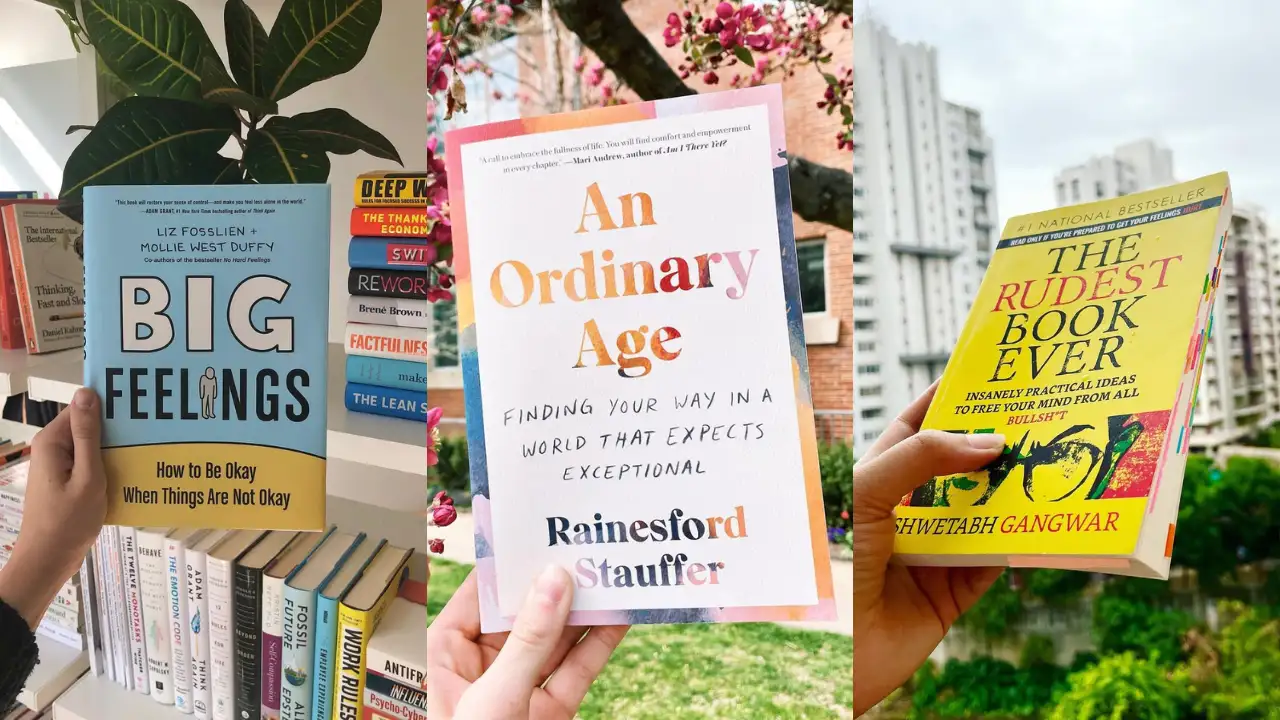By Girish Shukla
Copyright timesnownews

We’ve reached a point where self-help often sounds like a broken record, urging us to smile through stress, chase productivity, and fake gratitude even when we’re exhausted. But real growth isn’t always cheerful. It’s messy, reflective, and deeply human. The best self-help books aren’t sermons on happiness; they’re manuals for thinking differently, accepting discomfort, and building resilience without pretending life is perfect. These ten books do just that — honest, research-backed, and refreshingly unfiltered. Also Read: 10 Self-Help Books That Taught Me How to Talk to Myself Like Someone I Love 1. Tough Titties by Laura Belgray Laura Belgray’s memoir-meets-manifesto is a sharp, hilarious reminder that it’s never too late to become yourself. Rejecting the “hustle harder” culture, she writes candidly about failure, fear, and indecision. Her humour disguises deep wisdom about self-worth and timing. This isn’t about forced positivity; it’s about realising that authenticity, not ambition, is the ultimate success metric. 2. It’s OK to Be Angry About Capitalism by Bernie Sanders In this powerful reflection, Sanders blends politics with personal philosophy, showing how mental health and mindset are inseparable from social systems. He challenges the notion that success is a solo effort and instead argues for collective empathy and fairness. The book reframes frustration as clarity, encouraging readers to channel discontent into purpose, not cynicism. 3. An Ordinary Age by Rainesford Stauffer Rainesford Stauffer dismantles the myth of constant achievement that defines modern adulthood. Through journalism and sociology, she gives voice to those who feel left behind by society’s obsession with being exceptional. Her writing offers quiet permission to value rest, friendship, and emotional honesty over relentless striving. It’s a compassionate guide to reclaiming your humanity. 4. Toxic Positivity by Whitney Goodman Goodman, a licensed therapist, examines how the demand to “stay positive” often silences genuine emotion. Using real therapy cases and psychological research, she explains how denial masquerading as optimism can harm relationships and self-awareness. Her tone is empathetic and evidence-based, guiding readers toward emotional honesty. This is self-help that acknowledges pain as part of growth. 5. The Perfectionist’s Guide to Losing Control by Katherine Morgan Schafler A psychotherapist’s deep dive into the paradox of perfectionism, Schafler’s book balances clinical insight with compassion. She argues that perfectionism isn’t something to eliminate but to understand and redirect. Drawing from research and real-life clients, she helps readers transform control into creativity. It’s a nuanced redefinition of ambition that feels empowering rather than punishing. 6. Design Your Thinking by Pavan Soni Blending design thinking, behavioural psychology, and neuroscience, Pavan Soni offers a pragmatic framework for reprogramming thought patterns. His Indian perspective gives the genre a fresh context, showing how structured curiosity and iterative thinking can replace motivation with strategy. The book’s strength lies in its simplicity — a reminder that systems, not slogans, sustain success over time. 7. Big Feelings by Liz Fosslien and Mollie West Duffy Through humour and behavioural science, Fosslien and Duffy unpack the emotional turbulence of modern life — envy, burnout, uncertainty, and comparison. Instead of preaching calm, they teach understanding. Their illustrations and case studies make complex psychology accessible, proving that naming emotions is more powerful than suppressing them. It’s equal parts insight and comfort. 8. Stop Overthinking by Nick Trenton Trenton combines cognitive behavioural therapy with mindfulness to break the loop of anxiety and paralysis. Rather than pushing optimism, he focuses on self-regulation — the ability to interrupt mental spirals through awareness and action. His straightforward tone and science-backed techniques make this book ideal for readers seeking calm through clarity, not clichés. 9. Emotional Intelligence for the Modern Leader by Christopher D. Connors Connors applies emotional intelligence research to leadership and personal growth, arguing that empathy and reflection outperform motivation and control. His approach is data-driven yet deeply human, offering actionable frameworks for communication, trust, and resilience. The book reads like a masterclass in practical mindset shifts for anyone seeking balanced success. 10. The Rudest Book Ever by Shwetabh Gangwar Gangwar’s blunt, psychological commentary rejects the self-help industry’s obsession with positivity. He encourages emotional independence by examining human behaviour through logic and detachment. Direct, witty, and often uncomfortable, the book empowers readers to think critically about identity and validation. It’s a refreshing reminder that self-respect, not cheerfulness, is the foundation of strength. Also Read: 10 Self-Help Books That Feel Like a Friend, Not a Lecture Growth doesn’t always look like smiling through chaos. Sometimes it’s about acknowledging frustration, questioning norms, and learning to live with uncertainty. These books replace shallow optimism with genuine insight — proof that self-improvement isn’t about escaping difficulty but understanding it. The most powerful mindset shift is the quiet realisation that peace isn’t perfection; it’s perspective.